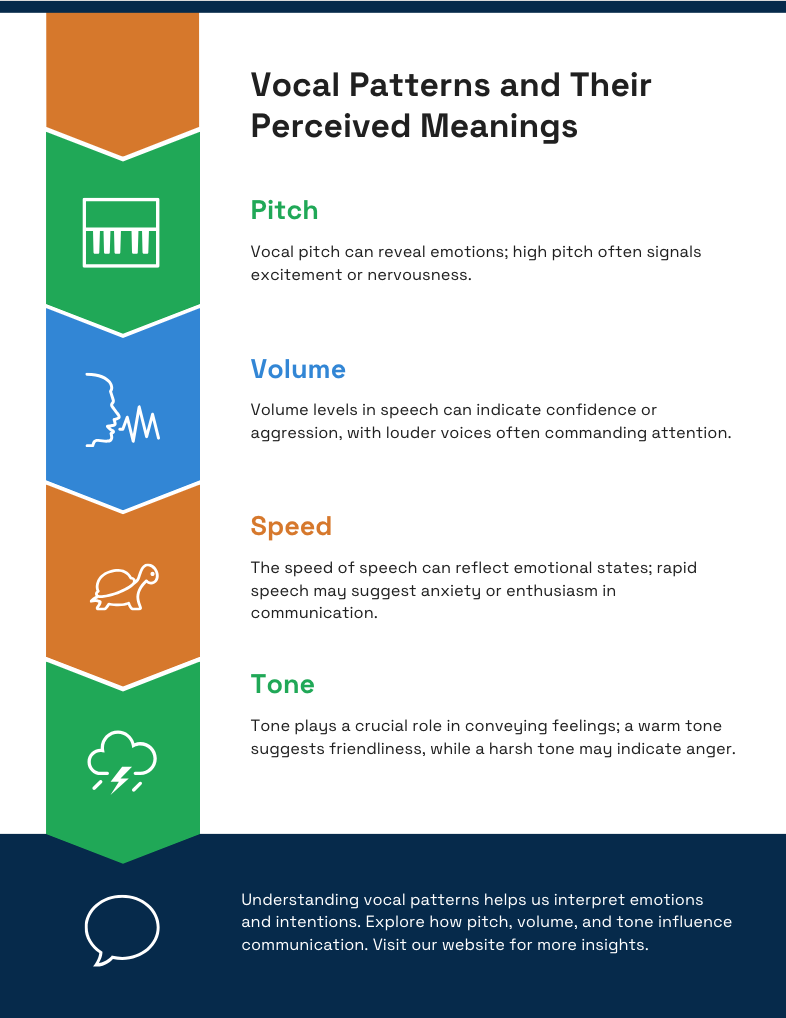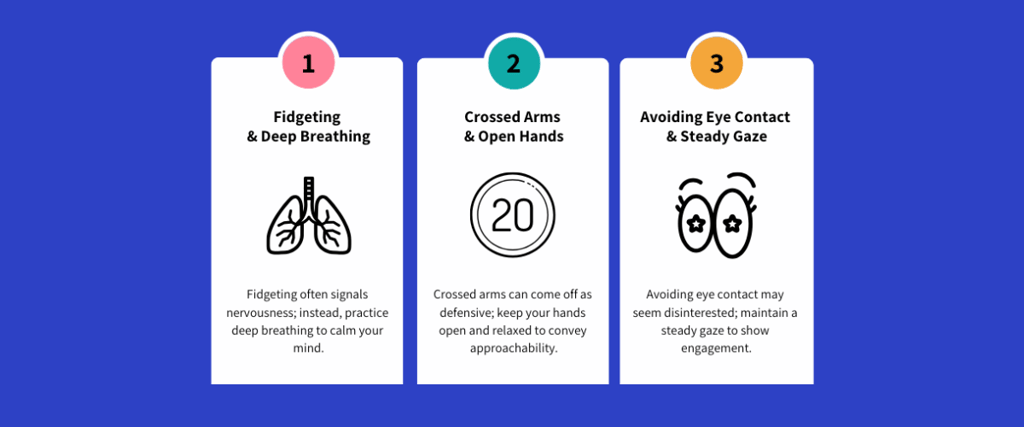The Silent Interview Killers: 5 Non-Verbal Mistakes That Cost You The Job (2025 Guide)
Discover the 5 critical non-verbal mistakes that could be costing you job opportunities. Research shows that over 50% of candidates fail interviews due to poor body language, with 68% of employers citing lack of eye contact as the top issue. Learn expert-backed techniques to master interview body language, from optimal eye contact strategies to controlling unconscious gestures. Perfect your non-verbal communication skills and significantly increase your chances of interview success.
J Matthew
5/6/20257 min read
The Silent Interview Killers: 5 Non-Verbal Mistakes That Cost You The Job (2025 Guide)
In the competitive landscape of job hunting, your words are only a small part of what communicates your potential value to employers. Research shows that over half of applicants fail job interviews due to body language mistakes, according to Career Builder. With statistics like these, understanding the impact of nonverbal communication has never been more crucial.
Recent studies reveal that 68% of employers cite lack of eye contact as the most common non-verbal mistake in interviews. With odds already stacked against job seekers, learning to avoid these nonverbal mistakes that could cost you an offer is essential for interview success.


Essential Non-Verbal Communication Techniques for Interview Success
Your body language speaks volumes before you even begin discussing your qualifications. Mastering the art of non-verbal cues can dramatically improve your chances of landing that dream job at your next mock interview or actual job interview.
The Trust Destroyer: Poor Eye Contact
Among the most critical nonverbal cues in employment interviews is eye contact. Failing to maintain appropriate eye contact sends immediate signals about your confidence, trustworthiness, and engagement level. Data shows that no eye contact is cited by 67% of employers as a significant interview mistake.
Why it matters: Eye contact is one of the first things hiring managers notice. Looking away too frequently, staring at the floor, or darting your eyes around the room suggests dishonesty, lack of confidence, or disinterest in the position.
How to fix it: Practice maintaining natural, comfortable eye contact during conversations. Research indicates you should maintain eye contact approximately 50% of the time when speaking and 70% when listening to build trust and demonstrate active engagement. This balance helps you appear engaged without staring intently.
The Confidence Killer: Negative Posture
Your posture communicates volumes about your self-assurance and professionalism. Slouching, crossing arms defensively, or leaning too far back in your chair signals discomfort or disinterest.
Why it matters: Research has identified posture as one of the most important nonverbal elements in the employment interview. Poor posture can make you appear unprofessional, lacking energy, or unconfident—all qualities employers actively avoid.
How to fix it: Sit with your back straight but not rigid, leaning slightly forward to demonstrate engagement. Keep your shoulders back and down, feet planted on the floor, and avoid crossing your arms, which can appear defensive or closed off.
![Side-by-side comparison of positive vs. negative interview posture]](https://assets.zyrosite.com/cdn-cgi/image/format=auto,w=1024,h=427,fit=crop/mePxegpG04hO7W4p/second-image-dOqaOvkMEMfLvvK3.png)
![Side-by-side comparison of positive vs. negative interview posture]](https://assets.zyrosite.com/cdn-cgi/image/format=auto,w=375,h=157,fit=crop/mePxegpG04hO7W4p/second-image-dOqaOvkMEMfLvvK3.png)
Technical Body Language Elements for Interview Success
Understanding the technical aspects of body language can give you a competitive edge in your next job interview.
The Credibility Eroder: Problematic Paralanguage
Paralanguage—the way you speak rather than what you say—encompasses vocal elements like tone, pitch, volume, and pacing. It also includes verbal fillers such as "um," "like," and "you know."
Why it matters: Experts have determined that paralanguage is among the most critical (nonverbal cues) in job interviews. Speaking too quietly suggests lack of confidence, while speaking too loudly may come across as aggressive. Excessive verbal fillers indicate nervousness and unprofessionalism.
How to fix it: Practice speaking clearly at a moderate pace and volume. Record yourself answering common interview questions and note how often you use filler words. Work on replacing these with brief, comfortable silences while you gather your thoughts.


Content Strategy for Maximum Interview Impact
Combining strong verbal content with effective nonverbal communication creates a powerful impression during your interview preparation.
The Impression Shapers: Inappropriate Facial Expressions
Your facial expressions form a critical part of first impressions in interviews and significantly impact your hireability. From nervous grimacing to inappropriate smiling or a flat, expressionless face, your facial cues communicate your emotional state and engagement level. Research indicates that not smiling is cited by 39% of employers as a significant interview mistake.
Why it matters: Facial expressions provide immediate information about your personality, attitude, and how well you might fit into the company culture. Employers are constantly reading these signals, often unconsciously, as they evaluate your candidacy.
How to fix it: Practice awareness of your facial expressions in professional settings. Career experts recommend making a strong entrance with appropriate facial expressions to set a positive tone. Use a pleasant, engaged expression that shows attentiveness and enthusiasm. Mirror the interviewer's energy level while maintaining authenticity. Regular practice with mock interviews in front of a mirror or on video can help you become more aware of problematic expressions. The measurable improvements in interview performance through structured practice are supported by compelling data that demonstrates the transformative power of professional preparation.
Optimizing Your Expressions
Practice makes perfect when it comes to facial expressions during interviews. Consider scheduling a mock interview session with a professional who can provide feedback on your nonverbal cues.
Incorporating Natural Expressiveness
Authentic facial expressions that match your words create trust. Work on developing a naturally pleasant and engaged appearance without seeming forced or artificial.
![Close-up of appropriate interview facial expressions]](https://assets.zyrosite.com/cdn-cgi/image/format=auto,w=1024,h=427,fit=crop/mePxegpG04hO7W4p/third-image-AQExLB9OPZF21j5P.png)
![Close-up of appropriate interview facial expressions]](https://assets.zyrosite.com/cdn-cgi/image/format=auto,w=375,h=157,fit=crop/mePxegpG04hO7W4p/third-image-AQExLB9OPZF21j5P.png)
Interview Preparation and Practice
Nothing builds confidence like thorough interview preparation. The more you practice both verbal and nonverbal elements of your interview, the more natural they'll become.
Schedule regular mock interviews with professionals or friends
Record yourself and analyze your nonverbal communication
Practice in clothes you'll wear to the interview
Simulate the interview environment as closely as possible
Body Language Strategies That Work
Effective body language strategies can dramatically improve your interview performance and chances of receiving a job offer.
The Hidden Saboteurs: Unconscious Gestures
Hand movements, fidgeting, hair touching, and other small gestures can reveal anxiety and distract from your message. Research shows that fidgeting too much is cited by 32% of employers as a significant non-verbal mistake in interviews. These unconscious movements are often more noticeable to interviewers than candidates realize.
Why it matters: Gestures are part of the nonverbal signals that employers use to assess candidates. Experts note that body language encompasses everything from eye contact and posture to clicking your pen and how you shake someone's hand. Excessive gesturing or fidgeting diverts attention from your qualifications and suggests nervousness or lack of professionalism.
How to fix it: Develop awareness of your habitual gestures by practicing interviews with a friend who can point them out. Keep your hands lightly clasped on the table or in your lap when not making purposeful gestures. If you tend to fidget, consider holding a pen without clicking it or subtly pressing your thumb against your forefinger as a non-visible outlet for nervous energy.


Building Quality First Impressions for Authority
The first 7 seconds of your job interview are crucial for establishing a positive impression. Your entrance, handshake, and initial greeting set the tone for the entire interview.
Key elements for a strong first impression:
Walk in with confident posture
Offer a firm, professional handshake
Make immediate eye contact with a genuine smile
Speak clearly when introducing yourself
Wait to be seated until invited
Internal Confidence Building Practices
Your internal state directly affects your external body language. Developing techniques to manage interview anxiety can help you project more confidence.
Practice deep breathing techniques before your interview
Visualize successful interview scenarios
Use positive affirmations to boost confidence
Arrive early to center yourself before the interview begins
Remember your qualifications and the value you bring
Optimizing Your Overall Interview Presence
Your entire presence during an interview communicates volumes about your professionalism and fit for the role.
Cultural Considerations in Body Language
While improving your nonverbal communication is important, it's worth noting that body language interpretation can sometimes work against diversity efforts. Research identifies body language assessment as potentially problematic because it often involves subjective judgments influenced by cultural biases.
Different cultures have varying norms regarding eye contact, personal space, and other nonverbal behaviors. What's considered appropriate in one context may be viewed negatively in another. The best approach is to research company culture and industry norms while remaining authentic to yourself.


Performance Factors in Interview Settings
The interview environment itself can affect your body language. Being aware of environmental factors can help you maintain positive nonverbal communication.
Key environmental considerations:
Room temperature (too hot or cold can increase fidgeting)
Chair height and comfort
Table positioning
Number of interviewers present
Room lighting
Measuring Interview Success and Follow-up
Understanding how to evaluate your interview performance can help you improve for future opportunities.
Post-interview self-assessment should include both what you said and how you presented yourself nonverbally. Consider asking for feedback from interviewers when possible, or work with a professional interview coach who can help you identify areas for improvement.
Many candidates benefit from professional mock interview services like those offered at mockinterviewspecialist.com, where trained coaches can provide objective feedback on both verbal and nonverbal aspects of your interview performance.
![Professional interview coach providing feedback to a client]](https://assets.zyrosite.com/cdn-cgi/image/format=auto,w=1024,h=427,fit=crop/mePxegpG04hO7W4p/seventh-YrDWEE7yxXtQyDXX.png)
![Professional interview coach providing feedback to a client]](https://assets.zyrosite.com/cdn-cgi/image/format=auto,w=375,h=157,fit=crop/mePxegpG04hO7W4p/seventh-YrDWEE7yxXtQyDXX.png)
Implementing Your Interview Strategy
Remember that over half of applicants fail job interviews due to body language mistakes. By being mindful of these five nonverbal mistakes and actively working to improve them, you significantly increase your chances of making a positive impression.
The good news is that nonverbal communication can be practiced and improved. Research-backed recommendations for interview body language include making a strong entrance, maintaining good posture, and using appropriate gestures. Consider working with a career coach, participating in mock interviews, or recording yourself to identify areas for improvement. With awareness and practice, you can ensure your body language speaks as impressively as your resume.
Your qualifications may get you in the door, but your nonverbal communication often determines whether that door leads to an offer or a rejection. With 68% of employers citing lack of eye contact as the most common non-verbal mistake, don't let these silent interview killers sabotage your career opportunities.
Ready to perfect your interview skills? With research showing that over half of applicants fail job interviews due to body language mistakes, professional coaching can make all the difference. Visit mockinterviewspecialist.com today to schedule a personalized mock interview session and get expert feedback on both your verbal and nonverbal communication skills.
Sources:
Mock Interview Specialist
"Tailored mock interviews for career growth success."
Want to receive helpful interview tips?
DBA Mock Interview Specialist - 2025 - All Rights Reserved


![ADVERTISEMENT rectangle for Mock Interview Specialist services]](https://assets.zyrosite.com/cdn-cgi/image/format=auto,w=1024,h=86,fit=crop/mePxegpG04hO7W4p/advertisement-red_-and-purple-background-1200w-x-100h-px-mP4OrJJo25twEkO3.png)


